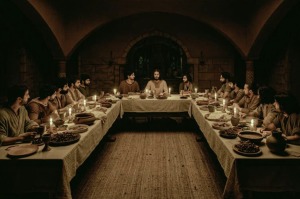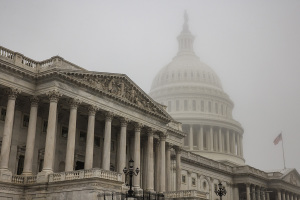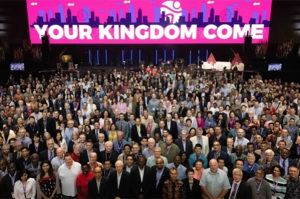Christians Entering a New Dark Age? (Pt.2)
Are Christians in America entering a new dark age? To many, it may seem so. Certainly the forces of secularism seem to be flexing their muscles in contemporary American culture. It often feels as if traditional Christian morality is retreating in disarray on an ever increasing number of fronts.
However, it should always be remembered that a moment in a culture's history does not necessarily mean the birth of a new era, secular or otherwise. One must always place the present in perspective. For Christians, perspective does not just encompass a nation's history, or even all of human history. Christians are called to a spiritual perspective that transcends the time-space continuum and stretches into what for lack of better terminology we label inadequately "eternity past" (all the time before time) and "eternity future" (all the time after time).
Such an eternal perspective should provide Christians with a perspective and balance that would preclude panic, euphoria, or despair. In fact, the late, great Chuck Colson declared that "despair is a sin," and for Bible-believing Christians it certainly is.
So how are Christians to conduct themselves in such a circumstance? I believe we must cultivate an Augustinian "already, but not yet" perspective, understanding that the temporal City of Man will never fully coincide with the divine City of God until God Himself culminates human history with the triumphant return of the Lord Jesus at a time and place of His choosing. And, contrary to the claims of some, no one knows when it will be. After all, Jesus Himself instructed us, "But of that day and hour knoweth no man, not the angels of heaven, but my Father only" (Matt. 24:26, 42, 44).
As Colson observed in "The Enduring Revolution," his acceptance speech upon receiving the Templeton Prize for Progress in Religion in 1993:
The God of Abraham, Isaac and Jacob reigns. His plan and purpose rob the future of its fears. By the cross He offers hope, by the resurrection He assures His triumph.
In the interim, Christians, having been given this eternal perspective by their spiritual transformation in Christ, live as citizens of the City of God, yet reside in the City of Man, a culture and worldview always in conflict with the City of God. Consequently, from an eternal perspective, victories, defeats, and setbacks are proximate, temporary, and incomplete in this temporal City of Man.
This "already, but not yet" eternal-temporal tension does not relieve Christians, however, of our duty to obey the Savior's commands concerning our duty and conduct in the present age. In Jesus' Great Commission to His followers, the Resurrected Savior commanded all His followers to "Go ye therefore, and teach all nations, baptizing them in the name of the Father, and of the Son, and of the Holy Ghost" (Matt. 28:19). Jesus' command, however, does not end with His exhortation to missions and evangelism.
The Great Commission also commands the discipling of new converts "to observe all things whatsoever I have commanded you" (Matt. 28:20). Among the many things we are to do as disciples of Jesus is "love your neighbor as yourself" (Matt. 22:39), which requires Christians to engage culture, not to withdraw from it.
If Christians obey that commandment, they will not only witness to the culture of the transforming love of the Jesus who died for them, but they will also work among other things to seek laws that protect the innocent, encourage stable family formation, and will seek ever greater good for all neighbors through fairer and more just government.
Jesus also commanded His disciples to be the "salt of the earth" and "the light of the world" (Matt. 5:13-14) and to "let your light so shine before men that they may see your good works and glorify your Father which is in Heaven" (Matt. 5:16). Jesus is commanding His disciples in every generation to be a preservative (salt) in society and to illuminate the darkness with the light of the Gospel. To obey these commands, Christians must be in contact with and touch the world as salt to preserve and purify and to be close enough to the world that people can see the light and feel the heat.
Jesus commands His disciples to both witness to the culture and to engage with the culture, seeking a society and a government that reflects more of God's truth, realizing always that the City of Man will never be the City of God until Christ returns in glory. Then and only then will they "beat their swords into plowshares, and their spears into pruning hooks" (Isa. 2:4).
In the interim, Christians are to bring an eternal perspective to bear on the City of Man and seek a world less unjust, with ever more protection for the weakest and the most vulnerable and exploited in society.
As Dr. Martin Luther King Jr., a Baptist minister, faced the massive racial injustice of mid-twentieth century America, he called Christians to live up to the heritage of their early Christian era spiritual ancestors. Facing much greater odds than current Christians face, these early century Christians fought and suffered for the truth they had received from their Savior. Dr. King observed that in those days the Church engaged the regnant, pagan culture with a willingness "to suffer for what they believed."
In his eloquent "Letter from the Birmingham Jail," Dr. King, in speaking the truth to a sub-biblical, hypocritical twentieth century American culture, pointed out that in the first centuries "the Church was not merely a thermometer that recorded the ideas and principles of popular opinion; it was a thermostat that transformed the mores of society."
Dr. King noted that their pagan enemies attacked them "for being 'disturbers of the peace' and 'outside agitators.'" The early church "went on with the conviction that they were a 'colony of heaven' and had to obey God rather than man." In doing so they ended "such ancient evils as infanticide and gladiatorial contest."
Thankfully, Dr. King went on to be salt and light in his era, engaging the culture and providing a prophetic example of being a moral thermostat in mid-twentieth century America.
The kind of culture and government that predominates in a particular culture or country evidently has a significant impact on the degree to which Christianity flourishes or languishes in a particular time and place.
How crucial is it to engage the culture? What difference does it make? Wayne Grudem has given us a graphic answer to these questions. In his Politics – According to the Bible (2010), Grudem notes that the present countries of North Korea and South Korea shared a common cultural and political history, language, and ethnicity until 1945, at which time it was partitioned into a communist North and a non-communist South. After the Korean War (1950-1953) devastated the entire peninsula, the countries have moved in polar opposite directions. North Korea is probably the most repressive, police state in the entire world. Christians are severely persecuted and even martyred for their faith. Millions of North Koreans never hear of the Gospel in their entire lives.
South Korea could not be more different. There, freedom of religion prevails and genuine Christianity has flourished as never before in Korean history. In fact, by some measurements, South Korea is now the most Christian society in the world per capita and South Korean churches are sending Christian missionaries around the globe to spread the "Good News" that Jesus saves!
Any sane Christian would hope and pray for a South Korean rather than a North Korean future for their country and for every country in the world.
Christians, resting in their eternal perspective of "already, but not yet," are to be prepared for either future. Whatever the temporal future may hold, we know it ends in victory for King Jesus. Until then, we know our duty and we have our marching orders.
As the writers and signers of the Manhattan Declaration (2009) have declared, "We are compelled by our Christian faith to speak and act in . . . defense" of "the sanctity of human life, the dignity of marriage as a union of husband and wife, and the freedom of conscience and religion" as "foundational principles of human justice and the common good."
May all American Christians of serious faith take to heart the Manhattan Declaration's pledge:
We are Christians who have joined together across historic lines of ecclesial differences to affirm our right – and, more importantly, to embrace our obligation – to speak and act in defense of these truths. We pledge to each other, and to our fellow believers, that no power on earth, be it cultural or political, will intimidate us into silence or acquiescence. It is our duty to proclaim the Gospel of our Lord and Savior Jesus Christ in its fullness, both in season and out of season. May God help us not to fail in that duty.
Amen!
Read Part 1, here.





























